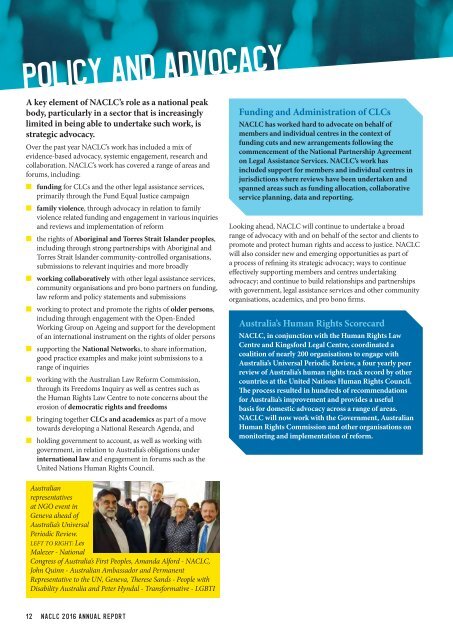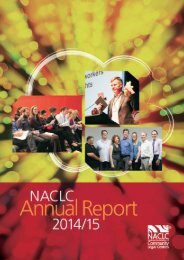NACLC Annual Report 2015/16
This is the 2015/16 NACLC Annual Report. This year's report is a much shorter version (of the traditional hardcopy report) than in previous years, but still highlights the work of NACLC over the period 1 July 2015 to 30 June 2016 and includes a select number of key financial reports. To see the full financial reports refer to the NACLC website. www.naclc.org.au
This is the 2015/16 NACLC Annual Report. This year's report is a much shorter version (of the traditional hardcopy report) than in previous years, but still highlights the work of NACLC over the period 1 July 2015 to 30 June 2016 and includes a select number of key financial reports. To see the full financial reports refer to the NACLC website. www.naclc.org.au
Create successful ePaper yourself
Turn your PDF publications into a flip-book with our unique Google optimized e-Paper software.
POLICY AND ADVOCACY<br />
A key element of <strong>NACLC</strong>’s role as a national peak<br />
body, particularly in a sector that is increasingly<br />
limited in being able to undertake such work, is<br />
strategic advocacy.<br />
Over the past year <strong>NACLC</strong>’s work has included a mix of<br />
evidence-based advocacy, systemic engagement, research and<br />
collaboration. <strong>NACLC</strong>’s work has covered a range of areas and<br />
forums, including:<br />
n funding for CLCs and the other legal assistance services,<br />
primarily through the Fund Equal Justice campaign<br />
n family violence, through advocacy in relation to family<br />
violence related funding and engagement in various inquiries<br />
and reviews and implementation of reform<br />
n the rights of Aboriginal and Torres Strait Islander peoples,<br />
including through strong partnerships with Aboriginal and<br />
Torres Strait Islander community-controlled organisations,<br />
submissions to relevant inquiries and more broadly<br />
n working collaboratively with other legal assistance services,<br />
community organisations and pro bono partners on funding,<br />
law reform and policy statements and submissions<br />
n working to protect and promote the rights of older persons,<br />
including through engagement with the Open-Ended<br />
Working Group on Ageing and support for the development<br />
of an international instrument on the rights of older persons<br />
n supporting the National Networks, to share information,<br />
good practice examples and make joint submissions to a<br />
range of inquiries<br />
n working with the Australian Law Reform Commission,<br />
through its Freedoms Inquiry as well as centres such as<br />
the Human Rights Law Centre to note concerns about the<br />
erosion of democratic rights and freedoms<br />
n bringing together CLCs and academics as part of a move<br />
towards developing a National Research Agenda, and<br />
n holding government to account, as well as working with<br />
government, in relation to Australia’s obligations under<br />
international law and engagement in forums such as the<br />
United Nations Human Rights Council.<br />
Funding and Administration of CLCs<br />
<strong>NACLC</strong> has worked hard to advocate on behalf of<br />
members and individual centres in the context of<br />
funding cuts and new arrangements following the<br />
commencement of the National Partnership Agreement<br />
on Legal Assistance Services. <strong>NACLC</strong>’s work has<br />
included support for members and individual centres in<br />
jurisdictions where reviews have been undertaken and<br />
spanned areas such as funding allocation, collaborative<br />
service planning, data and reporting.<br />
Looking ahead, <strong>NACLC</strong> will continue to undertake a broad<br />
range of advocacy with and on behalf of the sector and clients to<br />
promote and protect human rights and access to justice. <strong>NACLC</strong><br />
will also consider new and emerging opportunities as part of<br />
a process of refining its strategic advocacy; ways to continue<br />
effectively supporting members and centres undertaking<br />
advocacy; and continue to build relationships and partnerships<br />
with government, legal assistance services and other community<br />
organisations, academics, and pro bono firms.<br />
Australia’s Human Rights Scorecard<br />
<strong>NACLC</strong>, in conjunction with the Human Rights Law<br />
Centre and Kingsford Legal Centre, coordinated a<br />
coalition of nearly 200 organisations to engage with<br />
Australia’s Universal Periodic Review, a four yearly peer<br />
review of Australia’s human rights track record by other<br />
countries at the United Nations Human Rights Council.<br />
The process resulted in hundreds of recommendations<br />
for Australia’s improvement and provides a useful<br />
basis for domestic advocacy across a range of areas.<br />
<strong>NACLC</strong> will now work with the Government, Australian<br />
Human Rights Commission and other organisations on<br />
monitoring and implementation of reform.<br />
Australian<br />
representatives<br />
at NGO event in<br />
Geneva ahead of<br />
Australia’s Universal<br />
Periodic Review.<br />
Left to right: Les<br />
Malezer - National<br />
Congress of Australia’s First Peoples, Amanda Alford - <strong>NACLC</strong>,<br />
John Quinn - Australian Ambassador and Permanent<br />
Representative to the UN, Geneva, Therese Sands - People with<br />
Disability Australia and Peter Hyndal - Transformative - LGBTI<br />
12 <strong>NACLC</strong> 20<strong>16</strong> <strong>Annual</strong> <strong>Report</strong>



